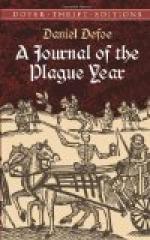But I must still speak of the plague as in its height, raging even to desolation, and the people under the most dreadful consternation, even, as I have said, to despair. It is hardly credible to what excesses the passions of men carried them in this extremity of the distemper; and this part, I think, was as moving as the rest. What could affect a man in his full power of reflection, and what could make deeper impressions on the soul, than to see a man almost naked, and got out of his house or perhaps out of his bed into the street, come out of Harrow Alley, a populous conjunction or collection of alleys, courts, and passages, in the Butcher Row in Whitechapel,—I say, what could be more affecting than to see this poor man come out into the open street, run, dancing and singing, and making a thousand antic gestures, with five or six women and children running after him, crying and calling upon him for the Lord’s sake to come back, and entreating the help of others to bring him back, but all in vain, nobody daring to lay a hand upon him, or to come near him?
This was a most grievous and afflicting thing to me, who saw it all from my own windows; for all this while the poor afflicted man was, as I observed it, even then in the utmost agony of pain, having, as they said, two swellings upon him, which could not be brought to break or to suppurate; but by laying strong caustics on them the surgeons had, it seems, hopes to break them, which caustics were then upon him, burning his flesh as with a hot iron. I cannot say what became of this poor man, but I think he continued roving about in that manner till he fell down and died.
No wonder the aspect of the city itself was frightful. The usual concourse of the people in the streets, and which used to be supplied from our end of the town, was abated. The Exchange was not kept shut, indeed, but it was no more frequented. The fires were lost: they had been almost extinguished for some days by a very smart and hasty rain. But that was not all. Some of the physicians insisted that they were not only no benefit, but injurious to the health of the people. This they made a loud clamor about, and complained to the lord mayor about it. On the other hand, others of the same faculty, and eminent too, opposed them, and gave their reasons why the fires were and must be useful to assuage the violence of the distemper. I cannot give a full account of their arguments on both sides; only this I remember, that they caviled very much with one another. Some were for fires, but that they must be made of wood and not coal, and of particular sorts of wood too, such as fir, in particular, or cedar, because of the strong effluvia of turpentine; others were for coal and not wood, because of the sulphur and bitumen; and others were neither for one or other. Upon the whole, the lord mayor ordered no more fires, and especially on this account, namely, that the plague was so fierce that they saw evidently it defied all




